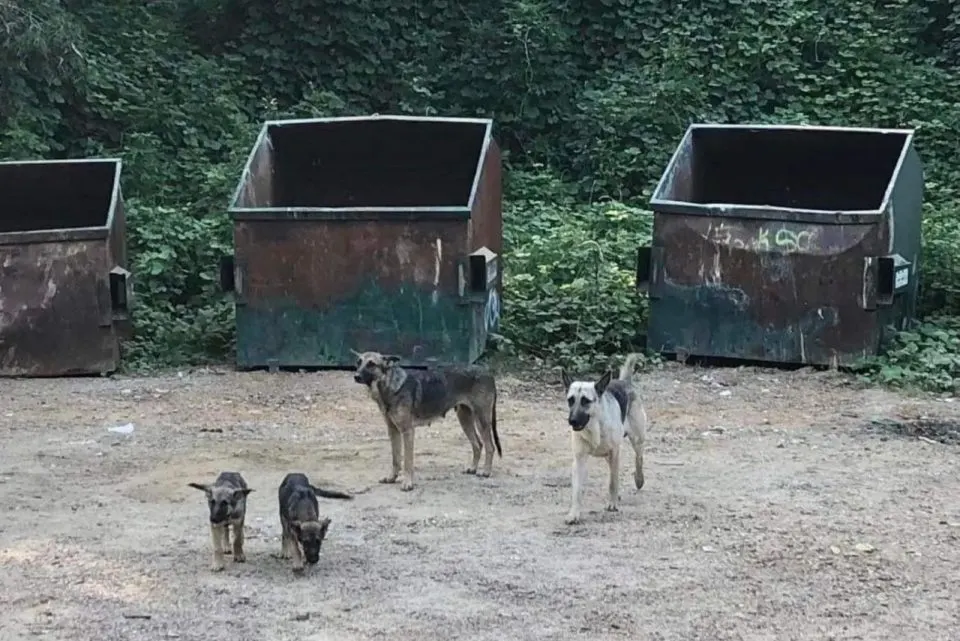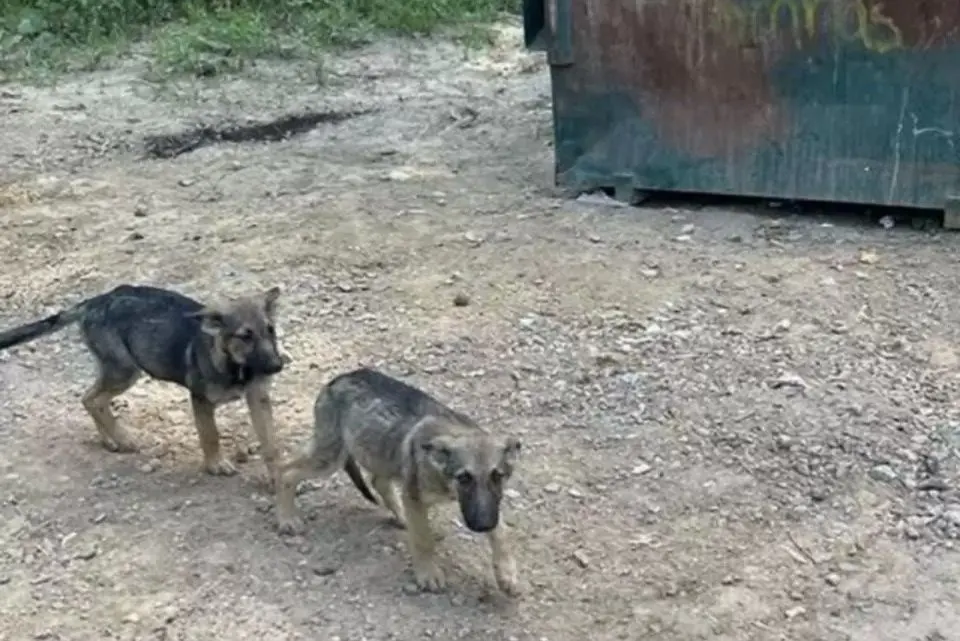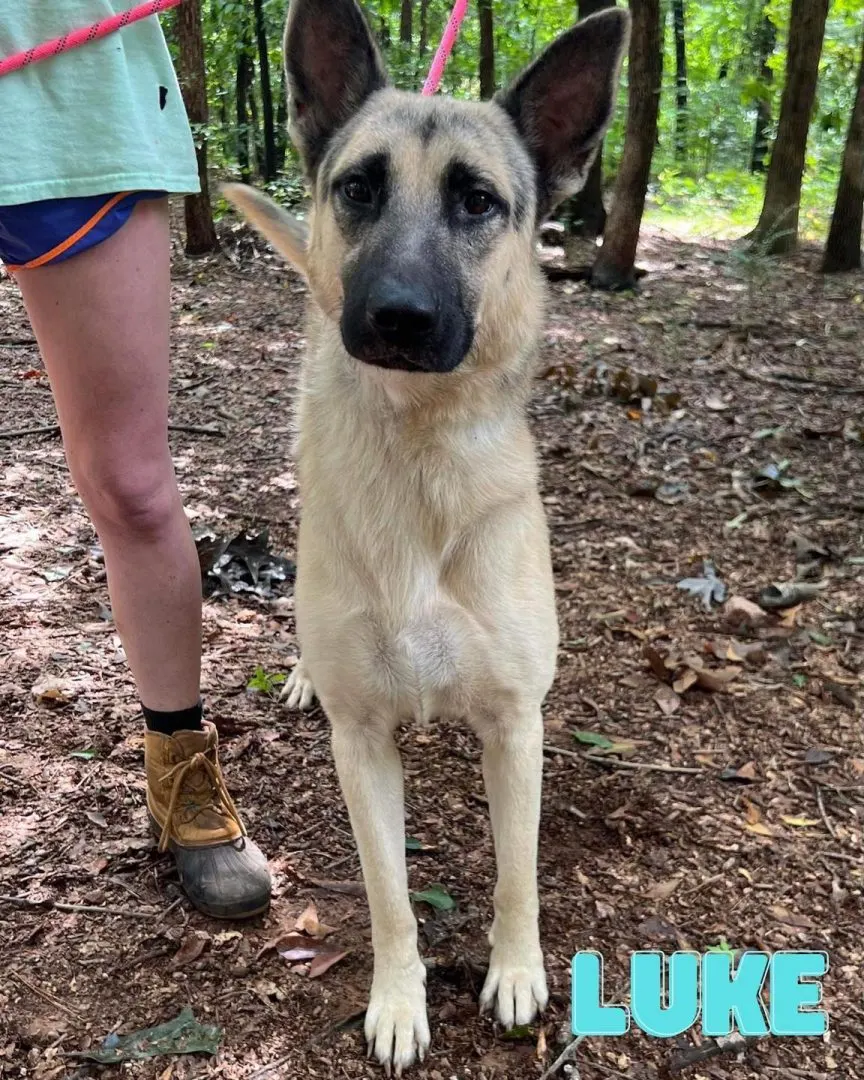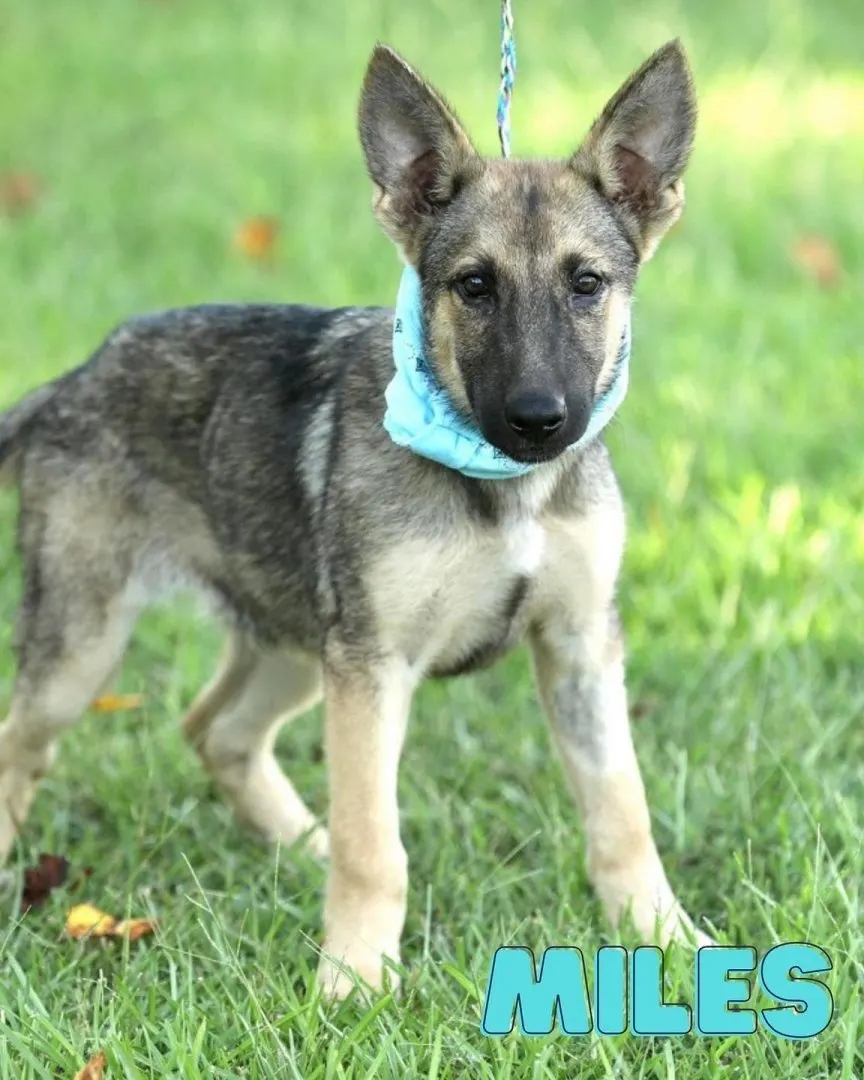Any true dog lover will never understand how someone could possibly leave their pet behind in inhumane conditions, be it on the stress, a dumpsite, or any other place but a shelter.
Unfortunately, there are many cases across the U.S. that we write about on a daily basis, but most of them have happy endings, just like the story of a GSD family that was abandoned on a dumpsite in Mississippi.
Hope Dies Last
NYC Second Chance Rescue Dogs posted a heartbreaking story of a German Shepherd family that was abandoned by their owners on a dumpsite, without food and water. Their rescue team saved the two puppies, but according to the volunteers, mom and dad went into the woods.

Lisa Reams, who is a volunteer in this organization and the director of Saving Grace Animal Rescue (SGAR), NYC Second Chance Rescue Dog’s sister shelter, searched for the two adult GSDs, but unsuccessfully.
Fortunately, Reams never gave up, and after a couple of days, she finally found the two doggos about 15 miles from the place where the puppies were picked up, as written in the organizations Facebook post:
“Days went by with no sign of them, but Lisa Reams, a rescue volunteer with our organization, never stopped looking. One week after the puppies were picked up, the mama and dad showed up nearly 15 miles from the dumpsite!”
What broke the hearts of rescuers was the fact that none of the pooches went far from the place where they were abandoned, although they had probably been there for days in hope that their owners might come back.

Strong Will To Live
As expected, the whole doggo family was in a bad state. They were malnourished and dehydrated, and the male adult’s heartworm tests came back positive. Fortunately, it was nothing untreatable, and the rest of the GSD crew didn’t have any serious health issues.

It seems that these pooches had a great will to live, and didn’t surrender, although they were betrayed by the ones who were supposed to take care of them.
Thankfully, there are still people like Lisa and other volunteers from rescues who put their maximum efforts into saving innocent pooches like this GSD family.
Time To Say Goodbye
Although the pooches were saved and brought together into the rescue center, unfortunately, they didn’t have the luck of staying together in their new home.

Volunteers from the rescue were aware of the fact that it’s almost impossible to find someone who would adopt the four German Shepherds at once, but what they couldn’t expect was that it would be challenging to find them homes even if separated.
One of the younger GSDs was adopted soon after the pooches were found, but the other three were replaced to the NYC Second Chance rescue, looking for a foster home,, as stated in the post:
“One of the pups has been adopted, but Miles (a 4-month-old male pup), Jenny (a 3-year-old mom), and Luke (a 3-year-old dad) are all available for adoption! We need foster homes for these gorgeous dogs asap!”

There is no available information on whether or not the family was adopted, but I really do hope all of the pooches found homes filled with the love and respect they deserve.
If you’ve ever noticed your furry companion making unusual wheezing sounds, it can be quite concerning. As a seasoned dog enthusiast, understanding the reasons behind your dog’s wheezing can help you provide the best care for your four-legged friend. Wheezing in dogs can stem from various factors, ranging from allergies and respiratory infections to foreign objects lodged in their airways.
Being attuned to your dog’s health signals is vital in ensuring their well-being. Wheezing is your dog’s way of communicating a potential issue that requires attention. By recognizing the possible triggers of your dog’s wheezing, you can take proactive steps to address any underlying issues and keep your canine companion happy and healthy.
Understanding Wheezing in Dogs
What Is Wheezing?
When your dog wheezes, it’s a sound made while breathing due to narrowed airways or an obstruction hindering airflow. Wheezing can be a sign of underlying health issues that need attention. It’s crucial to recognize this sound as it may indicate respiratory distress or another problem that requires veterinary care.
Recognizing the Signs of Wheezing
Identifying wheezing in dogs involves noticing audible high-pitched whistling sounds during breathing. Your furry companion may display other symptoms like coughing, sneezing, or difficulty breathing. Observing these signs can help you detect wheezing early and prompt timely intervention to ensure your dog’s health and happiness.
Common Causes of Wheezing in Dogs
Allergies and Environmental Factors
If your furry friend is wheezing, allergies to environmental factors like pollen, dust, or mold could be the culprit. Just like humans, dogs can have allergic reactions that lead to wheezing. Pay attention to seasonal changes and specific triggers in your surroundings that might be causing discomfort for your pup.
Respiratory Infections and Parasites
Respiratory infections, such as kennel cough or pneumonia, can result in wheezing in dogs. Parasites like heartworms can also lead to respiratory issues causing wheezing. Regular vet check-ups can help detect and treat these infections early, keeping your dog healthy and free from wheezing episodes.
Obstruction and Brachycephalic Breeds
Certain breeds with flat faces, like pugs or bulldogs, are prone to airway obstructions that can cause wheezing. Obstructions can also occur due to foreign objects stuck in the airways. Keep an eye on your dog’s breathing patterns, especially if they belong to a brachycephalic breed, to ensure they are not experiencing any obstructions leading to wheezing.
Diagnosing Canine Wheezing
Veterinary Examination Process
When you notice your dog wheezing, the first step is to take them to the vet for a thorough examination. The veterinarian will conduct a physical assessment to check for any underlying health issues that could be causing the wheezing. They will inquire about your dog’s medical history, including any recent changes in behavior or environment that might have triggered the wheezing.
Diagnostic Tests and Imaging
To pinpoint the exact cause of your dog’s wheezing, the vet may recommend diagnostic tests such as blood work, x-rays, or ultrasound scans. These tests can help identify respiratory infections, asthma, heartworm disease, or any other conditions affecting your dog’s breathing. Imaging studies like x-rays provide detailed insights into your dog’s lungs and airways, aiding in accurate diagnosis and targeted treatment.
Remember, early detection and proper diagnosis are essential in addressing your dog’s wheezing and ensuring they receive the necessary care promptly. Regular veterinary check-ups play a vital role in maintaining your furry companion’s health and happiness.
Treatment Options for Wheezing Dogs
Medical Interventions
If your dog is wheezing, the vet may suggest various medical interventions based on the underlying cause. Treatment options commonly include:
- Medication: Your vet might prescribe medications such as antibiotics for infections, bronchodilators to help open the airways, or corticosteroids to reduce inflammation.
- Surgery: In more severe cases, surgical procedures may be recommended to correct airway obstructions, such as elongated soft palate surgery for brachycephalic breeds.
- Allergy Management: If allergies are the culprit, antihistamines or allergy shots may be used to manage your dog’s symptoms and reduce wheezing episodes.
Home Remedies and Care
In addition to medical interventions, there are some home remedies and care practices that can help alleviate your dog’s wheezing:
- Clean Environment: Ensure your home is clean and free of potential irritants like dust, smoke, or strong odors that could trigger wheezing.
- Humidity Control: Use a humidifier in your home to maintain optimal humidity levels, especially in dry climates, to help soothe your dog’s airways.
- Regular Exercise: Keep your dog active with appropriate exercise to maintain overall respiratory health and prevent excess weight that could worsen wheezing.
Managing Chronic Wheezing
For dogs with chronic wheezing issues, long-term management strategies are crucial for their well-being:
- Follow-Up Vet Visits: Regular check-ups with your vet are essential to monitor your dog’s condition, adjust treatment as needed, and catch any complications early.
- Weight Management: Maintaining a healthy weight through proper diet and exercise is vital for managing chronic wheezing, especially in breeds prone to respiratory issues.
- Lifestyle Adjustments: Consider environmental changes like avoiding exposure to smoke, pollen, or other triggers that worsen wheezing in your dog’s daily life.
When to Seek Immediate Veterinary Care
Identifying Emergency Situations
In urgent cases of wheezing, such as sudden onset or severe distress, seek immediate veterinary care. Signs of an emergency include extreme difficulty breathing, pale gums, or collapsing. If your dog shifts into one of these states, do not delay – head straight to the nearest veterinary clinic or emergency facility. Immediate intervention is crucial to prevent serious repercussions and ensure your dog’s well-being.
Recognizing Critical Symptoms
Be alert to critical symptoms like persistent coughing, bluish gums, or gasping for breath. These signs indicate a severe issue requiring prompt attention. Observing any of these symptoms, do not hesitate – contact your vet immediately or visit an emergency animal hospital. Prompt action can be life-saving for your furry companion and aid in diagnosing and treating the underlying cause quickly.
Preventing Wheezing in Dogs
Lifestyle and Environmental Modifications
To help prevent wheezing in dogs, ensure your furry friend is in a clean and safe environment. Keep your home free of irritants like dust, smoke, and strong odors that could trigger wheezing episodes. Regularly clean your dog’s bedding and toys to reduce allergens. Additionally, maintain optimal humidity levels in your home, especially if your dog is prone to respiratory issues.
Regular Check-Ups and Vaccinations
Regular veterinary check-ups are key to preventing and managing wheezing in dogs. Make sure your dog’s vaccinations are up to date to protect against respiratory infections. During routine visits, your vet can detect early signs of respiratory issues, allowing for timely intervention. These check-ups also help monitor your dog’s overall health and address any potential concerns before they develop into serious problems.
Conclusion
Now you know the importance of recognizing wheezing in your furry friend. Whether it’s allergies, infections, or obstructions causing the wheezing, early detection is key. Regular vet visits are a must for keeping your dog healthy and happy. Remember, when your dog wheezes, don’t delay in seeking professional help. Treatment options vary, from medication to surgery if needed. Simple steps like maintaining a clean environment and managing humidity can make a difference. For chronic cases, consistent vet check-ups and lifestyle adjustments are crucial. And in emergencies, always seek immediate veterinary care. By staying proactive and making necessary changes, you can help your dog breathe easy.
Frequently Asked Questions
What are common causes of wheezing in dogs?
Wheezing in dogs can be caused by allergies, infections, airway obstructions, or underlying health conditions, especially prevalent in brachycephalic breeds.
Why is it important to address wheezing in dogs promptly?
Promptly addressing wheezing in dogs is crucial because it can be a sign of serious health issues that require early detection and treatment to prevent further complications.
What should I do if my dog is wheezing?
If your dog is wheezing, it is essential to seek veterinary care promptly. A vet examination, including physical assessment and diagnostic tests, is necessary to determine the cause and appropriate treatment.
What are the treatment options for wheezing in dogs?
Treatment for wheezing in dogs may involve medication, surgery for severe cases, and allergy management. Home remedies like maintaining a clean environment and humidity control can also help alleviate wheezing.
How can I prevent wheezing in my dog?
Preventing wheezing in dogs involves lifestyle and environmental modifications such as keeping the dog in a clean environment, managing humidity levels, regular vet check-ups, and up-to-date vaccinations. Weight management and lifestyle adjustments are also crucial for long-term prevention.
[no_toc]

Hey there, I’m Janet Brooks, a dog-loving student from California. I’m all about helping pups in need, especially those without homes. Me and my awesome friends work together to give shelter and love to stray dogs. Oh, and I also write blogs about dogs to share helpful info.